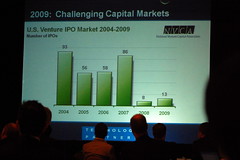 |
| http://www.flickr.com/photos/26373139@N08/5537894072 |
Have you ever wondered how an analyst comes up with a fair
value of a stock? I don’t know either. That’s why I started to study Financial
Statement analysis. Oh yes, I am an accountant by profession and I do analysis
every single day of my life. However, the analysis I am doing is quite
different from the analysis being performed in the stock market. Part of my
routine each day is to analyze the accounts of the companies I am handling. The
analysis is confine within the boundaries of the companies I am handling and
rarely do I consider the macro perspective of a company. Thus it is imperative
for me to sharpen my skills, broaden my knowledge and take the necessary
actions to become successful in stock market investing.
Financial analysis is the process of examining a company’s
performance in the context of its industry and economic environment in order to
arrive at a decision or recommendation.
An investor who buys stocks in the stock market is called an equity investor. In the same way, if an investor buys a stock in a private
company (not listed in the stock market), he is still called an equity
investor. The common denominator in this type of investors is that they are
buying stocks of a company. Before buying a stock, an investor engages the
services of a financial analyst to determine the price he shall pay for the shares.
The analyst shall look at the capability of the company to pay dividends and
grow its operations profitably.
A debt investor on the other hand is someone who lent his
money to a corporation with the intention of getting back the principal plus
interest. He is concerned on the capability of the company to repay its
principal and plus the interest.
 |
| http://www.flickr.com/photos/48889057888@N01/4291307654 |
Whether you are a debt investor or an equity investor, you
should make your due diligence before coming up with a decision. Part of the
due diligence you are going to make is evaluating the financial statements of
the company. The financial statements are composed of the following: Balance
Sheet, Income Statement, Cashflow Statement, Statement of Changes in Equity and
the notes to the financial statements. Every year, a company must submit the
audited financial statements to the Philippine Stock Exchange (PSE). In the Philippines,
a publicly listed company must submit the Audited Annual Financial Statements
and Quarterly Financial Reports. In addition, a publicly listed company must
submit Corporate Governance Report, Quarterly Public Ownership Report, Quarterly
Top 100 Stockholders, Statement of Changes in Beneficial Ownership of
Securities, Changes in Shareholdings of Director and other information required
by PSE. These financial reports and other information can be found in PSE (www.pse.com.ph) or company’s website. This information
will form as the foundation of your research and analysis of a company.
Outside information are as necessary as the basic data
provided by the PSE in order to arrive at a recommendation or decision. These include the economy, industry, and
comparable peer companies. For Philippine stocks, it is very common to compare
a company against its regional peers (Asia). Economic statistics can be gathered from the
websites of various government agencies while industry date can be taken from
industry publications.
No comments:
Post a Comment